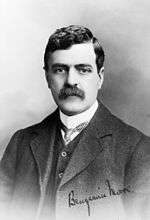Benjamin Moore (biochemist)
Benjamin Moore, FRS (14 January 1867 – 3 March 1922) was an early British biochemist. He held the first chair of biochemistry in the UK, and founded the Biochemical Journal, one of the earliest academic journals in the subject.
Benjamin Moore (biochemist) | |
|---|---|
 Benjamin Moore (biochemist) | |
| Born | 14 January 1867 |
| Died | 3 March 1922 |
| Nationality | British |
| Alma mater | Queen's College, Belfast Royal University of Ireland |
| Known for | Biochemical Journal |
| Scientific career | |
| Fields | Biochemistry |
Education and career
Educated at Queen's College, Belfast and the Royal University of Ireland, Moore's early positions were in the field of physiology at Yale University, Connecticut, United States and Charing Cross Hospital, London.[1] When the first British department of biochemistry was founded at the University of Liverpool in 1902, after a donation from Liverpool shipowner William Johnston, Moore took up the Johnston Chair, the first chair of biochemistry in the UK.[2][3]
He is credited (in The SMA and the Foundation of the National Health Service) by Dr Leslie Hilliard with the first use of the words "National Health Service" and the foundation of the State Medical Service Association.
During the First World War, he worked for the Medical Research Council in London. He became a professor of biochemistry at the University of Oxford in 1920.[1]
Biochemistry in the UK
Moore was central to the early development of the field of biochemistry in the UK. He founded the Biochemical Journal in 1906, with financial assistance from his research assistant, Edward Whitley.[2] Although the two sold the Biochemical Journal to the Biochemical Club (later the Biochemical Society) in 1912,[2] Moore retained his interest in the new journal, remaining on the editorial committee until 1921 and publishing further papers in it.[4]
In 1911, he was one of the founders of the Biochemical Society.[2]
Biotic Energy
Moore for many years studied the molecular physics and structure of the organism, he came to reject mechanist and materialist explanations for the organism but also opposed idealistic and spiritualist explanations. Instead he developed a theory of "biotic energy" which he discussed in his books The Origin and Nature of Life (1913) and Biochemistry (1921). Similar to the vitalists he claimed that there was an energy in living bodies which could not be described in terms of physics and chemistry. John Burroughs was supportive of his biotic energy theory.[5][6]
Awards and honours
Moore was elected a fellow of the Royal Society in 1912.[1]
Personal life
He married and had three children, but was devastated when his wife died suddenly of appendicitis in 1913.[3] His son Thomas Moore (1900–99) was a nutritional biochemist who became the first deputy director of the MRC Dunn Nutritional Laboratory.[7]
Moore died from pneumonia in Oxford in 1922.[1]
Selected works
- Moore B, Eadie ES, Abram JH. (1906) On the treatment of diabetes mellitus by acid extract of duodenal mucous membrane. Bio-Chem J 1: 28–38
- Moore B (1910) The Dawn of the Health Age
References
- The Royal Society: Library and Archive catalogue: Moore; Benjamin (1867–1922) (accessed 2 October 2007)
- Oliver R, Starley P. A reduced history of the Biochemical Journal Biochemist (February 2006) 42–45 Archived 27 July 2011 at the Wayback Machine (accessed 2 October 2007)
- Pitt GAJ. (2003) Liverpool: the early years of biochemistry Biochem Soc Trans 31: 16–19 (accessed 2 October 2007)
- Anon Biochemical Journal (1913) 7: i–vi & refer issues 1913–21 Archived 26 October 2007 at the Wayback Machine (accessed 2 October 2007)
- John Burroughs The Breath of Life 2006, pp. 90–94
- An essay by John Burroughs Scientific Vitalism Archived 13 May 2012 at the Wayback Machine
- Bates C. (1999) An appreciation: Thomas Moore Proc Nutr Soc 58: 751–2 (accessed 2 October 2007)
Further reading
- Hill L (1922) Nature 109: 348 (Obituary)
- Hopkins FG (1927) Proc Roy Soc Series B 101: xvii–xix (Obituary)